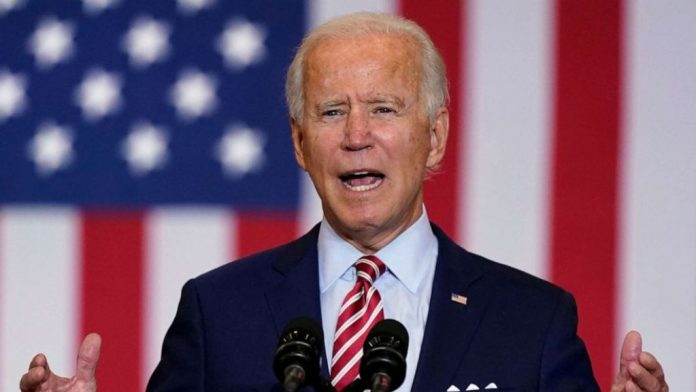WASHINGTON — President Joe Biden is proposing a $6 trillion budget next year that would greatly ramp up domestic spending and raise taxes on corporations and the wealthiest Americans.
Presidential budgets are crafted chiefly to be messaging documents, outlining priorities and making recommendations that Congress may take into consideration when drafting appropriation bills.
Biden’s first full budget recommendation includes sweeping new proposals he has already introduced, including trillions on infrastructure, free pre-K and community college, and increases to a range of domestic programs aimed at boosting public health and programs for the poor.
As Biden outlined on the campaign trail and as president, he would pay for the spending increases by raising taxes on corporations and the country’s highest earners. But even with higher taxes, his proposed budget would run a $1.8 trillion deficit in 2022. Officials reiterated that he would not impose new taxes on individuals making below $400,000.
“The Budget invests directly in the American people and will strengthen our Nation’s economy and improve our long-run fiscal health,” Biden said in a letter to Congress accompanying the proposal. “It reforms our broken tax code to reward work instead of wealth, while also fully paying for the American Jobs Plan and the American Families Plan over 15 years. It will help us build a recovery that is broad-based, inclusive, sustained, and strong.”
On a call with reporters, White House officials said the proposal, if enacted, would contribute to a speedy jobs recovery, arguing unemployment would fall to 4.7 percent by the end of 2021.
Administration officials projected there will be rising inflation, but only in the short term. Republican criticism of the administration has hinged heavily on warnings that the United States may face surging inflation as a result of stimulus funds pumped into the economy during the pandemic.
The White House has largely dismissed inflation warnings.
White House officials portrayed the budget as a front-loaded spending plan designed to take advantage of low interest rates with major investments in areas such as infrastructure, climate, education and scientific research now, and reduce deficits later on via higher taxes.
But for Republicans, the budget will provide ammunition to their case that Biden is a tax-and-spend Democrat who doesn’t care about debts and deficits.
Sen. Lindsey Graham, the top Republican on the Senate Budget Committee, declared Biden’s budget “dead on arrival — just like all other presidential budgets.”
“It is insanely expensive. It dramatically increases nondefense spending and taxes,” Graham, of South Carolina, said in a statement. “There will be serious discussions about government funding. But the Biden budget isn’t serious and it won’t be a part of those discussions.”
‘Shared prosperity’
White House press secretary Jen Psaki defended the budget, saying Biden inherited a deficit from the Trump administration and that the spending is needed to help the economy recover from the Covid-19 pandemic.
Under the final year of the Trump administration, the deficit reached $3.1 trillion as tax revenues sank from the economic downturn and spending surged in response to the pandemic.
Biden’s budget includes his more than $2 trillion infrastructure proposal and a $1.8 trillion plan to boost child care and education spending. It also includes $1.5 trillion for a range of domestic programs and a slight increase in defense spending.
Biden is currently negotiating his infrastructure plan with Republicans, who have countered with a proposal to spend roughly half as much and focus on more traditional infrastructure projects, such as roads, public transit and broadband.
“This budget takes advantage of the fiscal space created by historically low interest rates to make urgently needed investments that will contribute to growth and shared prosperity,” acting Office of Management and Budget Director Shalanda Young told reporters.
Biden’s child care and education proposal, called the American Families Plan, provides universal preschool to all 3- and 4-year-olds, as well as two years of free community college. The plan would also extend the federal child tax credit that was expanded in the American Rescue Plan.
Biden is recommending a $20 billion boost for schools in low-income areas, the creation of a $6.5 billion medical research program with a focus on cancer, and a $14 billion increase across the federal government to tackle climate change.
The budget also calls for a slight increase in defense spending, which would primarily be used to fund military salary increases, an administration official said.
Contrary to Republican warnings, the White House projected low interest rates and modest inflation.
Former President Donald Trump’s final budget proposal released shortly before the Covid-19 pandemic started spreading widely across the U.S. was for $4.8 trillion and included about $2 trillion in cuts to safety net programs, student loan programs and foreign aid while boosting funds for securing the southern border. / nbc














